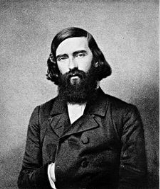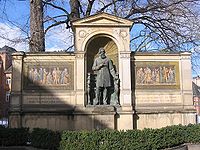
Albrecht von Gräfe
Encyclopedia
Friedrich Wilhelm Ernst Albrecht von Graefe (or Gräfe; May 22, 1828 – July 20, 1870) was a pioneering German
ophthalmologist. Graefe was born in Finkenheerd, Brandenburg
, the son of Karl Ferdinand von Graefe. He was the father of the far right
politician Albrecht von Graefe
.
At an early age he showed a preference for mathematics
, but this was gradually superseded by an interest in natural science
, which led him ultimately to the study of medicine
. After studying at Berlin
, Vienna
, Prague
, Paris
, London
, Dublin and Edinburgh
, and having devoted special attention to ophthalmology
, in 1850 he began to practice as an oculist in Berlin. He founded a private institution there for the treatment of eyes, which became the model of many similar clinics in Germany and Switzerland.
In 1853 he was appointed teacher of ophthalmology at the University of Berlin
; in 1858 he became an Extraordinary Professor, and in 1866 an Ordinary Professor. Graefe contributed greatly to ophthalmological science, particularly by the establishment in 1855 of his Archiv für Ophthalmologie, in which Carl Ferdinand von Arlt
and Franciscus Donders
collaborated. In 1870, he was elected a foreign member of the Royal Swedish Academy of Sciences
.
 Perhaps his two most important discoveries were his method of treating glaucoma
Perhaps his two most important discoveries were his method of treating glaucoma
and a new operation for cataract
. He was also regarded as an authority in diseases of the nervous system and brain. He died in Berlin from tuberculosis
on July 20, 1870. His grave is preserved in the Protestant Friedhof II der Jerusalems- und Neuen Kirchengemeinde (Cemetery No. II of the congregations of Jerusalem's Church
and New Church
) in Berlin-Kreuzberg
, south of Hallesches Tor
.
The eponymous "Gräfe's sign" is associated with Graves-Basedow disease
.
Germany
Germany , officially the Federal Republic of Germany , is a federal parliamentary republic in Europe. The country consists of 16 states while the capital and largest city is Berlin. Germany covers an area of 357,021 km2 and has a largely temperate seasonal climate...
ophthalmologist. Graefe was born in Finkenheerd, Brandenburg
Province of Brandenburg
The Province of Brandenburg was a province of the Kingdom of Prussia and the Free State of Prussia from 1815 to 1946.-History:The first people who are known to have inhabited Brandenburg were the Suevi. They were succeeded by the Slavonians, whom Henry II conquered and converted to Christianity in...
, the son of Karl Ferdinand von Graefe. He was the father of the far right
Far right
Far-right, extreme right, hard right, radical right, and ultra-right are terms used to discuss the qualitative or quantitative position a group or person occupies within right-wing politics. Far-right politics may involve anti-immigration and anti-integration stances towards groups that are...
politician Albrecht von Graefe
Albrecht von Graefe (politician)
Albrecht von Graefe was a German landowner and right-wing politician active both during the German Empire and the Weimar Republic...
.
At an early age he showed a preference for mathematics
Mathematics
Mathematics is the study of quantity, space, structure, and change. Mathematicians seek out patterns and formulate new conjectures. Mathematicians resolve the truth or falsity of conjectures by mathematical proofs, which are arguments sufficient to convince other mathematicians of their validity...
, but this was gradually superseded by an interest in natural science
Natural science
The natural sciences are branches of science that seek to elucidate the rules that govern the natural world by using empirical and scientific methods...
, which led him ultimately to the study of medicine
Medicine
Medicine is the science and art of healing. It encompasses a variety of health care practices evolved to maintain and restore health by the prevention and treatment of illness....
. After studying at Berlin
Berlin
Berlin is the capital city of Germany and is one of the 16 states of Germany. With a population of 3.45 million people, Berlin is Germany's largest city. It is the second most populous city proper and the seventh most populous urban area in the European Union...
, Vienna
Vienna
Vienna is the capital and largest city of the Republic of Austria and one of the nine states of Austria. Vienna is Austria's primary city, with a population of about 1.723 million , and is by far the largest city in Austria, as well as its cultural, economic, and political centre...
, Prague
Prague
Prague is the capital and largest city of the Czech Republic. Situated in the north-west of the country on the Vltava river, the city is home to about 1.3 million people, while its metropolitan area is estimated to have a population of over 2.3 million...
, Paris
Paris
Paris is the capital and largest city in France, situated on the river Seine, in northern France, at the heart of the Île-de-France region...
, London
London
London is the capital city of :England and the :United Kingdom, the largest metropolitan area in the United Kingdom, and the largest urban zone in the European Union by most measures. Located on the River Thames, London has been a major settlement for two millennia, its history going back to its...
, Dublin and Edinburgh
Edinburgh
Edinburgh is the capital city of Scotland, the second largest city in Scotland, and the eighth most populous in the United Kingdom. The City of Edinburgh Council governs one of Scotland's 32 local government council areas. The council area includes urban Edinburgh and a rural area...
, and having devoted special attention to ophthalmology
Ophthalmology
Ophthalmology is the branch of medicine that deals with the anatomy, physiology and diseases of the eye. An ophthalmologist is a specialist in medical and surgical eye problems...
, in 1850 he began to practice as an oculist in Berlin. He founded a private institution there for the treatment of eyes, which became the model of many similar clinics in Germany and Switzerland.
In 1853 he was appointed teacher of ophthalmology at the University of Berlin
Humboldt University of Berlin
The Humboldt University of Berlin is Berlin's oldest university, founded in 1810 as the University of Berlin by the liberal Prussian educational reformer and linguist Wilhelm von Humboldt, whose university model has strongly influenced other European and Western universities...
; in 1858 he became an Extraordinary Professor, and in 1866 an Ordinary Professor. Graefe contributed greatly to ophthalmological science, particularly by the establishment in 1855 of his Archiv für Ophthalmologie, in which Carl Ferdinand von Arlt
Carl Ferdinand von Arlt
Carl Ferdinand Ritter von Arlt was an Austrian ophthalmologist who was born in Ober-Graupen, a village near Teplitz in Bohemia. He earned his doctorate in Prague in 1839, and later became a professor of ophthalmology in Prague and Vienna...
and Franciscus Donders
Franciscus Donders
-External links:* B. Theunissen. , F.C. Donders: turning refracting into science, @ History of science and scholarship in the Netherlands.* in the Virtual Laboratory of the Max Planck Institute for the History of Science* P. Eling, , Geneeskundige en fysioloog....
collaborated. In 1870, he was elected a foreign member of the Royal Swedish Academy of Sciences
Royal Swedish Academy of Sciences
The Royal Swedish Academy of Sciences or Kungliga Vetenskapsakademien is one of the Royal Academies of Sweden. The Academy is an independent, non-governmental scientific organization which acts to promote the sciences, primarily the natural sciences and mathematics.The Academy was founded on 2...
.

Glaucoma
Glaucoma is an eye disorder in which the optic nerve suffers damage, permanently damaging vision in the affected eye and progressing to complete blindness if untreated. It is often, but not always, associated with increased pressure of the fluid in the eye...
and a new operation for cataract
Cataract
A cataract is a clouding that develops in the crystalline lens of the eye or in its envelope, varying in degree from slight to complete opacity and obstructing the passage of light...
. He was also regarded as an authority in diseases of the nervous system and brain. He died in Berlin from tuberculosis
Tuberculosis
Tuberculosis, MTB, or TB is a common, and in many cases lethal, infectious disease caused by various strains of mycobacteria, usually Mycobacterium tuberculosis. Tuberculosis usually attacks the lungs but can also affect other parts of the body...
on July 20, 1870. His grave is preserved in the Protestant Friedhof II der Jerusalems- und Neuen Kirchengemeinde (Cemetery No. II of the congregations of Jerusalem's Church
Jerusalem's Church
Jerusalem's Church is one of the churches of the Evangelical Congregation in the Friedrichstadt , a member of the Protestant umbrella organisation Evangelical Church of Berlin-Brandenburg-Silesian Upper Lusatia. The present church building is located in Berlin, borough Friedrichshain-Kreuzberg, in...
and New Church
Deutscher Dom
Deutscher Dom is the colloquial naming for the New Church located in Berlin on the Gendarmenmarkt across from Französischer Dom . Its parish comprised the northern part of the then new quarter of Friedrichstadt, which until then belonged to the parish of the congregations of Jerusalem's Church...
) in Berlin-Kreuzberg
Kreuzberg
Kreuzberg, a part of the combined Friedrichshain-Kreuzberg borough located south of Mitte since 2001, is one of the best-known areas of Berlin...
, south of Hallesches Tor
Hallesches Tor (Berlin U-Bahn)
The underground station Hallesches Tor is part of the Berlin U-Bahn network at the intersection of the east-west bound U1 and the north-south bound U6 in the Kreuzberg district.-Overview:...
.
The eponymous "Gräfe's sign" is associated with Graves-Basedow disease
Graves-Basedow disease
Graves' disease is an autoimmune disease where the thyroid is overactive, producing an excessive amount of thyroid hormones...
.
External links
- Graefe's sign at WhoNamedIt
- Biography and bibliography in the Virtual LaboratoryVirtual LaboratoryThe online project Virtual Laboratory. Essays and Resources on the Experimentalization of Life, 1830-1930, located at the Max Planck Institute for the History of Science, is dedicated to research in the history of the experimentalization of life...
of the Max Planck Institute for the History of ScienceMax Planck Institute for the History of ScienceThe Max Planck Institute for the History of Science in Berlin was established in March 1994. Its research is primarily devoted to a theoretically oriented history of science, principally of the natural sciences, but with methodological perspectives drawn from the cognitive sciences and from...

